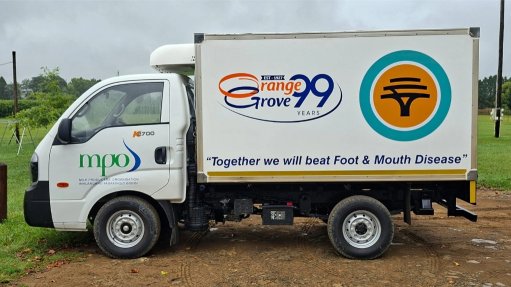Indigenous resources must benefit South African communities, says Ramaphosa

President Cyril Ramaphosa discusses climate change and how indigenous resources can benefit local communities
With a global emphasis on sustainability and the effects of climate change becoming more apparent, President Cyril Ramaphosa described the sustainable use of biodiversity as the “pillar of rural economies” across South Africa.
In a keynote address at the inaugural Biodiversity Economy and Investment Indaba, being held in Gauteng from March 25 to 27, he stated that sustainable biodiversity use supports job creation, while also contributing to urban economies through, for example, traditional medicine markets.
He noted, however, that compensation for indigenous knowledge held by local communities and payments to the communities that harvest plant and animal species was insufficient to support those communities.
“There must be tangible beneficiation in communities when indigenous plant species are harvested for commercial benefit, whether it is for medicine, cosmetics or other purposes.
“Sustainable mass cultivation of indigenous plant species must support the creation of businesses [but] also support the establishment of factories and other value chain networks that allow for end-products to be exported to the rest of the continent, and indeed, abroad as well. This mass cultivation can also assist land restoration and land rehabilitation as well as carbon sequestration, which is important in the context of climate change.”
To ensure a holistic approach to access and benefit sharing, Ramaphosa said government was developing nurseries for the production of indigenous species that could be cultivated for medicinal and cosmetic purposes.
Government has also established the Game Meat strategy focussed on scaling economic enterprises for communities and previously disadvantaged individuals.
This strategy is aimed at providing land use patterns compatible with local conservation ambitions.
On the marine biodiversity side, Ramaphosa noted that government allocated 15-year fishing rights in January to the small-scale fishing sector in the four coastal provinces of South Africa.
“We must build on this; job creation must be at the centre of our efforts.”
Moreover, he argued that mineral beneficiation should be emphasised more in South Africa, highlighting the importance of localisation.
To this end, the revised National Biodiversity Economy Strategy aims to synergise local economic and conservation objectives by emphasising that a successful biodiversity economy must be linked to ecosystem restoration.
Ramaphosa noted that the strategy broadens existing terrestrial goals and creates opportunities in sectors such as marine and freshwater.
“This strategy places the transformation of the biodiversity sector at the centre of all that we do. Now, rural communities that have always been relegated to the back, that have always suffered through disadvantage, must be put at the centre of what we do. Our traditional leaders must be part of devising new approaches to investment in community-owned land for biodiversity-based enterprises.”
Further, through partnership between the Department of Forestry, Fisheries and the Environment, Statistics South Africa and the South African National Biodiversity Institute, work is being done to develop natural capital accounting for the biodiversity sector.
This initiative is aimed at ensuring that the contribution of the biodiversity sector, including its entire value chain, is formally recognised and embraced, said Ramaphosa.
He also pointed out that African countries are among the most vulnerable to climate change. Hence, the Climate Change Bill, which is currently before the National Council of Provinces, aims to enable a just transition towards a low-carbon, climate-resilient society.
He argued that the just transition must contribute towards the creation of work, social inclusion and poverty eradication.
“The Bill recognises that a robust and sustainable economy, as well as a healthy society depend on the services that well-functioning ecosystems provide. The Bill maintains that enhancing the sustainability of economic and social and ecological services is an integral component of an effective and efficient climate change response.”
He argued that a just transition is expected to create new economic sectors, thereby increasing the need for upskilling and reskilling initiatives to enable those most affected by the transition to be active participants in the new economies.
“Just as we will rely on forging meaningful partnerships between business, government and communities to grow and restore our country's conservation estate, we also need to deepen collaboration on ventures that help us to mitigate and adapt to climate change and its ongoing effects.”
Article Enquiry
Email Article
Save Article
Feedback
To advertise email advertising@creamermedia.co.za or click here
Press Office
Announcements
What's On
Subscribe to improve your user experience...
Option 1 (equivalent of R125 a month):
Receive a weekly copy of Creamer Media's Engineering News & Mining Weekly magazine
(print copy for those in South Africa and e-magazine for those outside of South Africa)
Receive daily email newsletters
Access to full search results
Access archive of magazine back copies
Access to Projects in Progress
Access to ONE Research Report of your choice in PDF format
Option 2 (equivalent of R375 a month):
All benefits from Option 1
PLUS
Access to Creamer Media's Research Channel Africa for ALL Research Reports, in PDF format, on various industrial and mining sectors
including Electricity; Water; Energy Transition; Hydrogen; Roads, Rail and Ports; Coal; Gold; Platinum; Battery Metals; etc.
Already a subscriber?
Forgotten your password?
Receive weekly copy of Creamer Media's Engineering News & Mining Weekly magazine (print copy for those in South Africa and e-magazine for those outside of South Africa)
➕
Recieve daily email newsletters
➕
Access to full search results
➕
Access archive of magazine back copies
➕
Access to Projects in Progress
➕
Access to ONE Research Report of your choice in PDF format
RESEARCH CHANNEL AFRICA
R4500 (equivalent of R375 a month)
SUBSCRIBEAll benefits from Option 1
➕
Access to Creamer Media's Research Channel Africa for ALL Research Reports on various industrial and mining sectors, in PDF format, including on:
Electricity
➕
Water
➕
Energy Transition
➕
Hydrogen
➕
Roads, Rail and Ports
➕
Coal
➕
Gold
➕
Platinum
➕
Battery Metals
➕
etc.
Receive all benefits from Option 1 or Option 2 delivered to numerous people at your company
➕
Multiple User names and Passwords for simultaneous log-ins
➕
Intranet integration access to all in your organisation


















